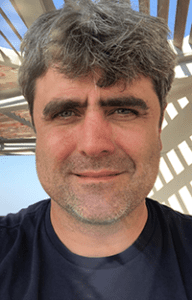For Immediate Release
Wednesday, October 17, 2018
9:15 a.m. U.S. Pacific Time
Media Contact:
Nalini Padmanabhan
301.634.7346
press@ashg.org
Findings Reported at ASHG 2018 Annual Meeting

(courtesy Dr. Fontanillas)
SAN DIEGO, Calif. – By combining data on individuals’ lifetime sun exposure and their genetics, researchers can generate improved predictions of their risk of skin cancer, according to findings presented at the American Society of Human Genetics (ASHG) 2018 Annual Meeting in San Diego, Calif.
Pierre Fontanillas, PhD, and colleagues at 23andMe, Inc., collected genetic and survey data from over 210,000 consented research participants of European descent. They analyzed the data to identify correlations between previously known and potentially novel skin cancer risk factors and the occurrence of three forms of skin cancer: melanoma, basal cell carcinoma (BCC), and squamous cell carcinoma (SCC). Past studies had found that exposure to ultraviolet (UV) light increases skin cancer risk, as do other environmental factors such as living in a sunnier climate or at a higher altitude, and personal factors such as lighter skin pigmentation, higher numbers of moles on the skin, and family history of skin cancer.
“We aimed to validate previously known skin cancer risk factors in a large cohort, add detail to these and explore potential new ones, and find out whether and how these factors might interact with genetic risk,” said Dr. Fontanillas.
They found that while each single factor was not particularly significant on its own, multiple factors could be combined into statistical models that were more informative. The best-performing models incorporated a genetic risk score composed of data on up to 50 genetic variants, along with survey data on family history, skin pigmentation and sensitivity, number of moles, estimated current sun exposure, sunbathing frequency before the age of 30, and body mass index (BMI).
The new models achieved a high predictive accuracy (area under the curve [AUC], between 0.81 and 0.85). Genetic factors alone accounted for 8.3 to 15.2 percent of the variance explained in skin cancer risk. Although the three skin cancers have different physiology, models did not find fundamental differences between the three cancer types, nor did they show strong interaction between genetic and environmental risk factors. While the self-reported nature of the survey data permitted researchers to collect a large dataset, it also presented some challenges, Dr. Fontanillas noted.
“Measuring lifetime exposure is generally challenging. It is particularly hard to capture sun exposure and when in life it happened, and it may be that some of the other correlates we found, like higher BMI, reflect a lack of outdoor activity rather than being directly correlated with risk of skin cancer,” he said.
Moving forward, the researchers plan to expand their sample to groups with non-European ancestry and are exploring additional methods of calculating genetic risk score and measuring sun exposure. They hope to eventually obtain risk estimates accurate enough to be used by individuals and clinicians.
Presentation:
Dr. Fontanillas will present this research on Wednesday, October 17, 2018, from 9:15-9:30 a.m., in Ballroom 20BC, Upper Level, San Diego Convention Center.
Press Availability:
Dr. Fontanillas will be available to discuss this research with interested media on Wednesday, October 17, 2018, from 11-11:45 a.m. in the ASHG 2018 Press Office (Room 22).
Reference:
Gursoy G et al. (2018 Oct 17). Fontanillas P et al. (2018 Oct 17). Abstract: Combining genetic and exposure data significantly improve risk prediction for skin cancer. Presented at the American Society of Human Genetics 2018 Annual Meeting. San Diego, California.
About the American Society of Human Genetics (ASHG)
Founded in 1948, the American Society of Human Genetics is the primary professional membership organization for human genetics specialists worldwide. Its nearly 8,000 members include researchers, academicians, clinicians, laboratory practice professionals, genetic counselors, nurses, and others with an interest in human genetics. The Society serves scientists, health professionals, and the public by providing forums to: (1) share research results through the ASHG Annual Meeting and in The American Journal of Human Genetics; (2) advance genetic research by advocating for research support; (3) educate current and future genetics professionals, health care providers, advocates, policymakers, educators, students, and the public about all aspects of human genetics; and (4) promote genetic services and support responsible social and scientific policies. For more information, visit: http://www.ashg.org.
6120 Executive Blvd, Suite 500 | Rockville, MD 20852 | 301.634.7300 | society@ashg.org | www.ashg.org
Connect with ASHG on Twitter (@GeneticsSociety) | Facebook | LinkedIn
